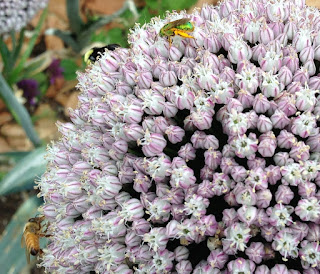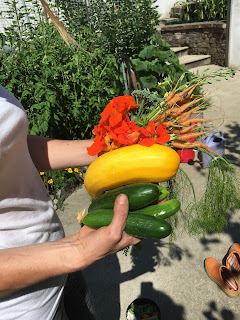Wednesday, August 3, 2016
Sunday, July 31, 2016
Monday, July 18, 2016
Friday, April 29, 2016
Got Snails? 7 Tips To Rid Them From Your Garden

As far as I’m concerned, slugs and snails are public enemy #1 in the garden. Last year, they decimated our green beans and sweet peas and made our lettuce a hole-y mess.
This year I am committed to fighting these pests, protecting our organic garden and successfully harvesting our favorite veggies. After doing some research (see http://www.wikihow.com/Get-Rid-of-Snails) and talking with a number of experienced gardeners, I’ve realized there’s not just one solution. These critters are sneaky! Therefore, we need to be smart and creative about how we keep them out of the garden.
Here are a seven ideas for eliminating slugs and snails from your garden. The good folks at Walt’s Organic suggest using a combination of repellents. From bait to traps to barriers, try a few techniques and learn what works best for your garden plot.
1.
 Beer traps. A well-known technique, with mixed results.
Beer traps. A well-known technique, with mixed results. 2.
 Copper. We’ve used this technique successfully over the last couple growing seasons. But I never understood why it worked until researching for this article. Copper repels snails due to a reaction between the metal and the mucous (or slime) produced by the snail as it moves. This sends the snail an unpleasant electro-neural signal, which basically feels like an electric shock. Copper can be used a couple of different ways. Either wind it around the area you want to protect or sprinkle copper pennies around the base of the plants.
Copper. We’ve used this technique successfully over the last couple growing seasons. But I never understood why it worked until researching for this article. Copper repels snails due to a reaction between the metal and the mucous (or slime) produced by the snail as it moves. This sends the snail an unpleasant electro-neural signal, which basically feels like an electric shock. Copper can be used a couple of different ways. Either wind it around the area you want to protect or sprinkle copper pennies around the base of the plants. 3.
 Crushed egg shells. Sprinkle crushed egg shells on the earth surrounding the vulnerable plants. Egg shells have sharp edges which make it very unpleasant for snails and slugs to cross, so they avoid climbing over them to get to the plants. This is a great way to nourish the soil as egg shells contain calcium which reduces acidity and increases the pH. Oyster shells offer the same type of barrier.
Crushed egg shells. Sprinkle crushed egg shells on the earth surrounding the vulnerable plants. Egg shells have sharp edges which make it very unpleasant for snails and slugs to cross, so they avoid climbing over them to get to the plants. This is a great way to nourish the soil as egg shells contain calcium which reduces acidity and increases the pH. Oyster shells offer the same type of barrier. 4.
 Coffee. Studies conducted by the U.S. Department of Agriculture have shown that coffee is extremely effective at repelling and killing snails and slugs. You can either place cooled coffee in a spray bottle and spritz the plants, soils and snails themselves. Or, sprinkle coffee grounds around the base of the plants you want to protect. In addition to repelling slugs and snails, coffee also helps to enrich the soil.
Coffee. Studies conducted by the U.S. Department of Agriculture have shown that coffee is extremely effective at repelling and killing snails and slugs. You can either place cooled coffee in a spray bottle and spritz the plants, soils and snails themselves. Or, sprinkle coffee grounds around the base of the plants you want to protect. In addition to repelling slugs and snails, coffee also helps to enrich the soil.5. Move them: If you think this sounds like an exercise in futility, you may be right. But simply picking up and moving snails just 20 feet away from your garden can be an effective strategy.

6. Snail-hating plants. Certain flowers, plants and herbs are believed to be unappealing to snails, so think about introducing them to your garden. These include flowers such as marigolds and herbs such as parsley, mint, and fennel.
7.
 PVC pipe. PVC pipes and ceramic pots act as a trap. Cut a PVC pipe in half the long way, put it curved side down in the soil. The snails will gather underneath it. Alternatively, place a ceramic pot upside-down and leave overnight. Once you’ve caught the critters, you need to eliminate them some ways away from the P-Patch or smash them so that they can’t return.
PVC pipe. PVC pipes and ceramic pots act as a trap. Cut a PVC pipe in half the long way, put it curved side down in the soil. The snails will gather underneath it. Alternatively, place a ceramic pot upside-down and leave overnight. Once you’ve caught the critters, you need to eliminate them some ways away from the P-Patch or smash them so that they can’t return. How are you planning on keeping slugs and snails out of your garden? Please share your experience of what works and what hasn’t worked for you.
* Many of the statistics and ideas cited here are from http://www.wikihow.com/Get-Rid-of-Snails
Sunday, February 28, 2016
March 5th - Spring Organizing Meeting & Work Party
It's our 7th annual Spring Brunch Organizing Meeting & Work Party!
When: 10 am March 5th, (it's always the first Saturday of every March)
Where: 4212 Baker Ave NW (just two doors up from the P-Patch)
What: Coffee/tea provided, please bring whatever you'd like to share, dress appropriately for the weather.

We'll gather promptly at 10 a.m. for organizing meeting (usually takes an hour or so), then our work party (usually about another hour or so, wrapping up no later than 12:30).
Our community work party follows at the garden rain or shine, so plan to dress for the weather & tasks at hand. Folks also often stay on after the work party to help each other get individual plots ready for Spring & informal socializing over yummy leftovers.
Proposed agenda items & activities include:
* Welcoming any new co-gardeners & supporters
* Reviewing P-Patch guidelines & other great info from P-Patch program
* Update on native plant slope retaining fence/wall
* Lower plaza bench discussion & decision-making
* Info on our honeybee hive
* Annual planning, site leadership & committees
* Sign-ups & prep for spring work party activities:
* Sharing our gardening ideas & seed swap, bring your extra seeds!
* Preparing our community garden for Spring!
All Hazel Heights supporters and guests are invited and welcome, not just individual plot gardeners. At least one representative from each plot needs to attend, but the more the merrier so please help spread the word!
See you at the P-Patch!
Coming Soon: Seattle Tilth’s March Edible Plant Sale
It’s the first edible plant sale of the year!
When: March 12, 2016 from 9am-3pm
Where: Rainier Beach Urban Farm and Wetlands, 5513 S. Cloverdale St., Seattle
 |
This plant sale is a little different from the plant sale that typically happens late April/early May as it specializes in early spring starts perfect for planting in cool and wet weather.There will be lots of organic, sustainably and locally grown vegetables such as peas, lettuce, kale, rhubarb, artichokes, asparagus, Romanesco and strawberries. You’ll even find edible flowers and culinary herbs.
In addition, classes will be offered on such topics as Asian Greens, Perenials and Protecting Early Crops with Cloches.
Admission is free.
For more information, visit Seattle Tilth.
Subscribe to:
Posts (Atom)



















